Dr. Stelios Antoniadis at the Cultural Center of Constantinople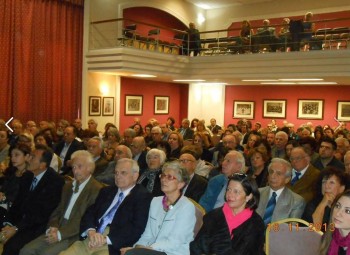
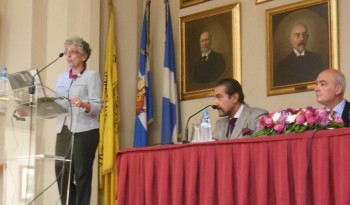
On Saturday, 16 November 2013, mytheatro.gr attended a packed room at the Cultural Center of Constantinople, where, under the auspices of the Hellenic Zografian Association and Tsoukatou Publications, the presentation of Dr. Antoniadis’s books “Istanbul, the City that Follows me” and “Doxografima ‘ took place. It is worth noting that the event happened in celebration of 120 years of Zografio School and was attended by major names from the world of arts, literature and medical science. The speech was started by Mr. Antoniadis as coordinator, who initially warmly thanked the audience and proceeded to present the important work of Tsoukatou Editions on the history of Istanbul, since through those books, it is possible for history to be curved through the years.
Later on, Mrs. Tsoukatou started her speech and, after she made a reference to the overall effort a book needs, until it reaches the reader’s hands, thanked all those who have contributed to this effort. It is worth mentioning that a part of the book’s income will be donated to strengthening the Zografio School.
Born in Istanbul and living there in his youth, Mr. Antoniadis studied in Zografio high school and has deeply-rooted within him the value of this school, which is referred to as “Lighthouse of Hellenism”. That value grows even further, considering that it is one of the few Greek educational institutions remaining in the City.
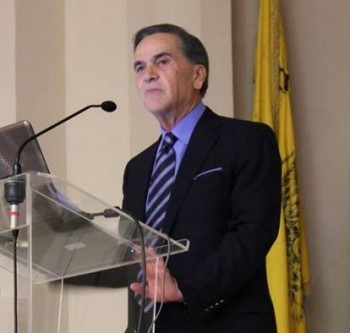
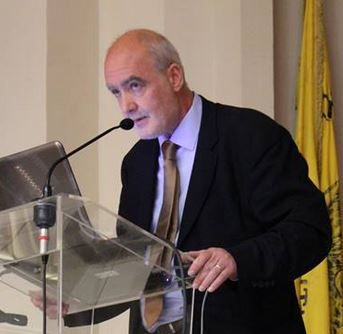
Throughout the speakers, attended the President of the World Pediatric Society, Andreas Konstantopoulos who, after he mentioned the significant progress of the writer in medical science, noted both the value that the project has provided in pediatric cardiology and his ability to pass on his knowledge through his literary talent. Afterwards, he made a reference on each of the author’s books separately praising him for the eloquent but yet intelligible writing. Finally he mentioned the important research he seems to have done in his book “Doxografima” but also how useful the book can be proven for each of us, in these difficult times.
By critically and literary terms, Mr. Antoniadis’s project was approached by Kostas Margonis, philologist and critic himself. Having made us know that their relationship began accidentally in a book presentation, he mentions that he wrote the criticism of the project spontaneously. Some interesting excerpts from the review are the following: “Here, the author not only exists but is omnipresent.” “The core of the book is the narration of personal, family, social and historical events. The semantics of birthplace is catalytic”. Particularly significant position holds the representation by means of the written word. The author, through the eyes of a child, tells us the story of a troubled period. Furthermore, Mr. Margonis analyzed the literary ways that adorn the author’s lovely narration: “The literary ways intersperse the narration and charm the reader. They motivate him to study the book and make it interesting.
The soluble and concise expression, the preference for nouns to refer to situations or crises but also for verbs to outsource feelings, the narrator’s null focus, the honesty and the purity in expression are the author’s literary means. He concludes that the book “Constantinople, the City that Follows me” is a deed of love for the Greeks. However, He did not miss to speak about the other author’s book, “Doxografima” which according to the critic, it shows the author’s “mental alertness and multifarious personality”.
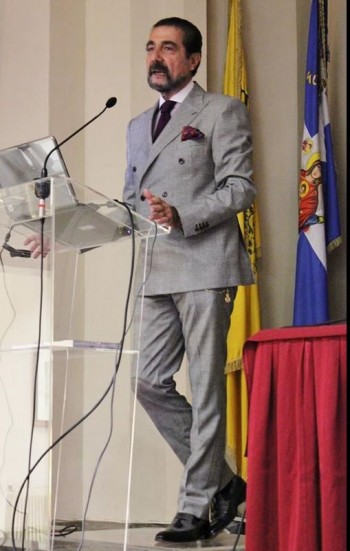
The speech was carried on by Mr. Antoniadis with a reference to all his previous books and the conditions under which some of them were written. He finally spoke about the place of his heart, Istanbul claiming that he never thought to blame other countries for what happened. The responsibility belongs purely to Greece and the foreign policy it adopted. “The Greek state never understood that Constantinople was always more or less Greek with the largest sophisticated urban population of Greeks in the world.”
Shortly before closing his speech, he made us know that “Doxografima” was born through a habit he had all those years to take notes while reading, check pages and write some comments. Because, that’s what Doxografima (Kudos Writing) was, in the ancient days: A book that also contains important pieces of authors from many different books alongside the critical opinion of the author that issues it. This book, according the author, helps us overcome our fears of concepts that have plagued humankind for years, such as death, old age, sickness, riches, poverty, etc. It is an anthology dedicated to his daughter Aethra. His speech finally ends with beautiful slides of photos with colleagues who stood beside him and played a role in the writing and creation of his work but also a “thank you” for all the support he was given.
Watch all the speech and each speaker’s comments
Clip 1) Stelios Antoniadis, Professor of Cardiology
Clip 2) Mrs. Tsoukatou from Tsukatou Editions
Clip 3) Mr. Stelios Antoniadis talks about Zografio
Clip 4) Andreas Konstantopoulos talks about Mr. Stelios Antoniadis
Clip 5) Kostas Margonis talks about the work of Mr. Stelios Antoniadis
Clip 6) Mr. Stelios Antoniadis talks about the books he has written
